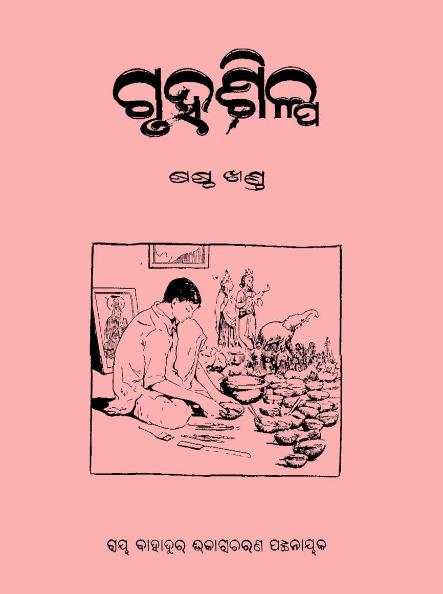Published in 1940, Gruhashilpa Part-6 by Bhikari Charana Patnaik serves as a pivotal volume in the series dedicated to the art and science of homemaking within Odia culture. This book expands on the themes of previous volumes, providing readers with detailed insights and practical advice on a variety of domestic activities. It stands as a testament to Patnaik’s commitment to preserving and uplifting the cultural heritage of Odisha through the lens of household management.
Gruhashilpa Part-6 is meticulously structured to serve as both a manual and a resource for families interested in enhancing their domestic skills. Patnaik’s approach is inclusive, aiming to empower readers—especially women—by providing them with the knowledge necessary to create harmonious, well-organized homes. The volume covers a broad range of topics, from traditional crafts and cooking to effective housekeeping strategies, reflecting the holistic nature of domestic life.
Patnaik’s writing is accessible and engaging, ensuring that readers can easily grasp and apply the techniques discussed. His enthusiasm for the subject matter shines through, making the book not only informative but also enjoyable to read.
One of the hallmarks of Gruhashilpa Part-6 is its in-depth exploration of various domestic arts. Patnaik delves into traditional crafts such as weaving, decoration, and pottery, providing detailed instructions and tips that allow readers to engage in these activities with confidence. By documenting these skills, he emphasizes the importance of craftsmanship in everyday life, celebrating the creativity and resourcefulness that characterize Odia households.
The culinary section is particularly noteworthy, offering a rich array of traditional Odia recipes that reflect the region’s agricultural bounty and cultural influences. Patnaik emphasizes the use of seasonal ingredients and time-honored cooking methods, encouraging readers to embrace the joys of cooking and to view it as an enriching experience rather than a mere chore. This focus on culinary arts fosters a deeper appreciation for local food traditions and the communal aspects of sharing meals.
A central theme of Gruhashilpa Part-6 is the empowerment of women through education and skill development. Patnaik advocates for the integration of traditional knowledge with contemporary practices, encouraging women to take pride in their roles as homemakers. By providing practical guidance, he reinforces the idea that the management of a household requires both skill and expertise.
This volume serves as a source of inspiration for women to cultivate their talents, recognize their contributions, and assert their importance within the family unit. Patnaik’s inclusive perspective fosters a sense of agency, making it clear that the domestic sphere is a space for innovation and personal growth.
Apart from its practical advice, Gruhashilpa Part-6 is an important cultural artifact that reflects the values and customs of Odisha in the early 20th century. Patnaik weaves cultural references throughout the text, highlighting the significance of traditions, rituals, and the collective memory of the community. This cultural context enriches the reader’s understanding of the practices he describes, reinforcing the connection between domestic activities and cultural identity.
By preserving these practices, Patnaik contributes to the broader narrative of Odia heritage, ensuring that future generations recognize the importance of their cultural roots.
Books Info
| Books name | Gruhashilpa Part-6 / ଗୃହଶିଳ୍ପ |
| Author | Bhikari Charana Patnaik |
| No Of pages | 60 |
| Publisher | NA |
| Publication | 1940 |
| Printed At | NA |
| Distributor | NA |

